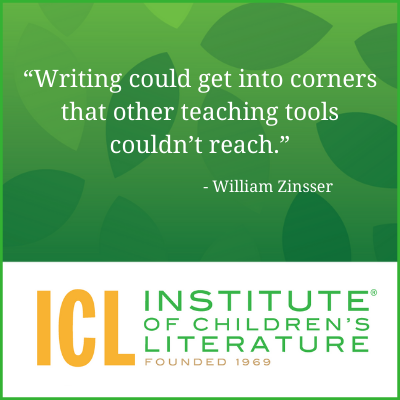
5 Ways Writers Can Prep for 2025 Goal Setting
Before we roll on to the new writing year, let’s harness our optimism for the blank slate before us and prepare for our 2025 Goal Setting just for writers.

We teach our students how to write and get published!
View our Course Catalog >
Not every young person aspires to be a professional writer. (I know, it’s shocking, but it’s true.) Still, everyone in society today benefits from being able to communicate clearly and professionally through writing. Even “the trades” offer opportunities to communicate through the written word when promoting the business or communicating with clients. Because of this, it’s worthwhile to ask the question: How can an online writing class help a homeschool student who isn’t thinking about publishing as a future interest?

Then I suggested he consider starting his own autobiography now while his young years were fresh in his mind. If he began now, then when the time came for a story of his life to be published, he’d be ready with the kinds of information he had wanted in sports biographies. Also he’d have a good start for when he was playing professional basketball and had little time for writing.
He saw the logic in that and spent hours on the writing, soon completely caught up in it. And while writing, we talked about the demands of the publishing business, especially in regards to accuracy in a nonfiction book such as a biography. He began to recognize the need to find different bits of information to support that writing, so he began interviewing the adults in his life and researching to get facts and details right. He spent hours on writing because we’d found the subject he loved. He was eager for feedback on how to make the book better, and began to recognize the place of revision in the writing process.
That’s the power of writing with personal interest and publication in mind. Good writing classes are usually designed to do exactly this, helping students to write in the areas that interest them most.
Now, the student I taught never did go on to be a professional basketball player (though he did get involved with Parks and Rec), but the skill building he’d gained in that early writing help him not only communicate better, but also understand and evaluate the written word better. Let’s look at three aspects of writing instruction and the ultimate benefits: research, originality, and revision.
All writers research, therefore research plays a part in virtually all online writing classes. Good writing courses teach students that research is more than checking out what Wikipedia says about a subject. Good research skills give students the tools to evaluate information they come across and react to it appropriately (picking which to use in their writing and which to discard.) This process makes such students far less likely to fall prey to scams and far less likely to take things written on social media at face value. These are things that are helpful even if the student has no intention of pursuing the career in writing.
Many students who tend to dislike report writing will also shy away from research. They don’t want to do the report, and so they stall or fail to invest in all the elements of report writing. This is one place that homeschool excels since study is often tailored to the interests of the student. A student, for instance, whose life goal is working with animals could find it interesting to write about animal-related careers or simply about animals themselves. And if the writing itself is given a purpose, interest increases even more. Consider the example of the young basketball enthusiast. Because he saw a purpose in the research he needed to do in order to ensure accuracy in his autobiography, he didn’t shy away from the work of interviewing and researching.
More than that, most good writing classes teach students that not all sources are created equal. The need for credible sources, those that are acceptable to a publisher, push students to think deeply about the sources for the material they intend to use. Does the source have a bias? Is the information available from more than one unconnected source? What are the credentials of those producing the information? All of these questions and more become part of the research process.
Another thing that good online writing classes teach is the importance of originality and the perils of plagiarism. Many young writers don’t really understand plagiarism. They don’t really understand the basics of copyright protection. They don’t recognize the importance of being original in everything they write. None of us write things that are singularly unique, but we can be original. We can produce the work that comes from us, not simply copying what someone else created. By understanding the importance of originality and the perils of copying, writers learn to produce original work to meet the requirement and standard of publication.
Plagiarism is the copying of someone else’s writing and passing it off as your own. There is no minimum amount of copying before you have committed plagiarism. Copying as little as a sentence without attribution is plagiarism. Plagiarism can also occur with barely reworded paraphrasing of someone else’s work in order to produce something based solely on the research, organizational structure, and talent of another writer. This kind of plagiarism is also a copyright violation, making it a legal issue as well as a moral one. Copyright law says that if a work is dependent on a pre-existing work, it is a derivative of it, and only the original creator is legally allowed to create a derivative work. So wise writers create material with a variety of different research sources, that is written in the wise writer’s own words.
Plagiarism is not uncommon in classroom writing where students hope teachers won’t be familiar with the original material and therefore won’t catch the copying. In a classroom, such behavior can result in a failing grade (at some Universities it can also result in being expelled from the University). In the world of publishing, such activities can result in lawsuits. So copying is an extremely serious issue. Online writing courses often help steer students away from the lure of plagiarism by requiring a variety of research sources. The more sources a writer draws from, the less likely he is to lean too heavily on any one. Also, most online classes stress the importance of crediting any direct quotes because this is necessary for publication. Thus, students learn to avoid some of the mistakes that can result in serious problems in their future writing endeavors.
The last valuable skill students learn in online writing classes is the necessity of polished prose. Often in a classroom setting, students turn in reports that are basically only scanned for spelling errors or typos (if that much). But an online course geared to teach publishable writing will include revision as a fundamental and essential process. Revision in this setting doesn’t simply mean error correction; it means considering the clarity of the organization of ideas, continuity, and reading ease. In such a course, revision isn’t simply to get the best grade, it’s to create the best, clearest, and most interesting writing that accomplishes what the student sets out to accomplish. As students practice these revision skills, they’ll not only improve their own writing, but they’ll be able to become more discerning consumers of written material. They’ll begin to question bad writing when they see it, and be less inclined to give the contents of badly written online material the same credibility. This helps students discern poor research, poor logic, and manipulative materials, and that helps make students less open to scams.
Research, Originality, and Revision provide value for students long after the final lesson for any online writing class is over. They help prepare for all written communication created by the student in the future. They make students smarter, and more discerning about the wealth of written information coming at all of us in this modern world. And they may unlock possibilities and strengthen talents previously unconsidered. All in all, online classes may just be the homeschool family’s best friend.
With over 100 books in publication, Jan Fields writes both chapter books for children and mystery novels for adults. She’s also known for a variety of experiences teaching writing, from one session SCBWI events to lengthier Highlights Foundation workshops to these blog posts for the Institute of Children’s Literature. As a former ICL instructor, Jan enjoys equipping writers for success in whatever way she can.

Before we roll on to the new writing year, let’s harness our optimism for the blank slate before us and prepare for our 2025 Goal Setting just for writers.

Writers can be thin-skinned when it comes to getting feedback on their work. Let’s look at 4 ways to positively deal with constructive criticism!

Rejection is part of the territory when it comes to being a writer. Today we offer reflection for writers to help redirect your efforts after a rejection.
1000 N. West Street #1200, Wilmington, DE 19801
© 2024 Direct Learning Systems, Inc. All rights reserved.
1000 N. West Street #1200, Wilmington, DE 19801
© 2024 Direct Learning Systems, Inc. All rights reserved.
1000 N. West Street #1200, Wilmington, DE 19801
© 2024 Direct Learning Systems, Inc. All rights reserved.
1000 N. West Street #1200, Wilmington, DE 19801
© 2025 Direct Learning Systems, Inc. All rights reserved.
1000 N. West Street #1200, Wilmington, DE 19801
©2025 Direct Learning Systems, Inc. All rights reserved. Privacy Policy.